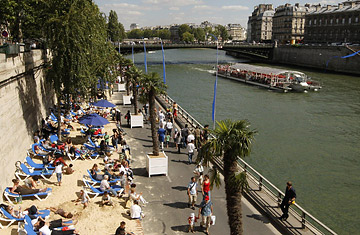
People enjoy the sun as "Paris Plages" (Paris Beaches) opens along the banks of River Seine in Paris
The sand is white, the beach chairs are in place, and a hot sun has broken through what for weeks had been a relentlessly chilly gray sky. And here, sun-worshippers can cool off without risking painful stings from the jellyfish that have plagued the beaches of France's south coast. But if the weather has finally gotten summery just as the Paris's urban beach season kicks into full swing, don't expect everyone in the City of Light to be giddy over the efforts to bring a little Côte d'Azur to the banks of the Seine. For a sizeable and increasingly vocal number of the city's residents, Paris Plage ought to be named Paris Plague.
"Every year we get the crowds, the litter, the traffic jams, and noise that make the neighborhood awful for a full month," says a resident of the Village Saint-Paul apartment complex in Paris' fourth arrondissement, which becomes beach-front property at this time of year as the city authorities transform a two-mile stretch of riverbank into a white-sand beach. This pensioner, who gives his name only as Michel, explains, "I don't feel like being accused of being a kill-joy as people always are when they dare complain about Paris Plage." Indeed, so pervasive is fear of that stigma that most of those who groused to TIME about the city's otherwise celebrated annual beach season preferred to remain anonymous.
"I used to go on summer vacation in September, but I've started leaving in August" says a 41 year-old resident named Arnaud, explaining his desire to escape the Paris Plage crowds. "Try driving a car in this [expletive] place when [expletive] Paris Plage is on," shouted a red-faced motorist and central Paris resident who used another unprintable term when asked for his name. "They close the expressway on the river to make room for the beach, which means we get gridlock on the streets, and nowhere left to park when we finally get home."
That's a lot of vexation for a beach party that, even in its seventh year, still generates lots of enthusiasm among visitors. And this year the crowds are expected to exceed the 3.8 million average of recent years. That's because the sluggish economy is preventing many Parisians from heading to the coast or the country: recent polls show that 42% of French people report forsaking this summer's vacation for financial reasons. So many more residents of the capital and its working class suburbs will rely instead on the river beach and its 1,000 deck chairs, 85 boats and daily cultural events that continue until August 21.
"It's the event, the place to be — and it's almost like being on a real beach," says a 25 year-old unemployed man from a northern Paris suburb named Marouane. "Also, this is one of the few times people like us feel like we're welcome in the rich neighborhoods of central Paris. Usually we're being told to get back to our suburbs."
Social integration, in fact, was one of the objectives behind Paris Plage when Socialist Mayor Betrand Delanoë launched it in 2001, hoping to create a common, festive space for Parisians, suburbanites and tourists in the heart of the city. Since then, the scheme has not only continued getting rave reviews and excellent press — it's also been flattered by imitation across France, and also in Prague, Berlin, Amsterdam and Rome.
Still, even the best of ideas have enemies, and the inconvenienced residents of "beach-front" Paris are not the only ones complaining. Groups working with the homeless say the event displaces people living under the bridges or elsewhere along Paris Plage's expanse. Others have drawn attention to the environmental impact of Paris Plage, which generates over 66 tons of garbage, and requires polluting barges and trucks to dump its 2,000 tons of sand and other installations. And some critics rail over the $5 million annual cost of a facility that vanishes after four weeks, arguing that the $35 million spent over the seven years of Paris Plage events could have been spent on durable recreation facilities.
At least one person is willing to talk about Paris Plage with his identity revealed. Former Delanoë adviser Serge Federbusch has become an active critic of the mayor's management and spending. In his book Delanopolis, Federbusch contends that Delanoë's urban policies are actually politically correct, trend-conscious pandering to ill-conceived popular projects. Paris Plage in particular, Federbusch writes in an online debate, is "pure propaganda produced by the mayor; driven by press attention and motivated by not one of the essential objectives of the city of Paris." Maybe, but it sure is popular with most everyone living further than a petanque ball toss from the beach in the heart of the city.
